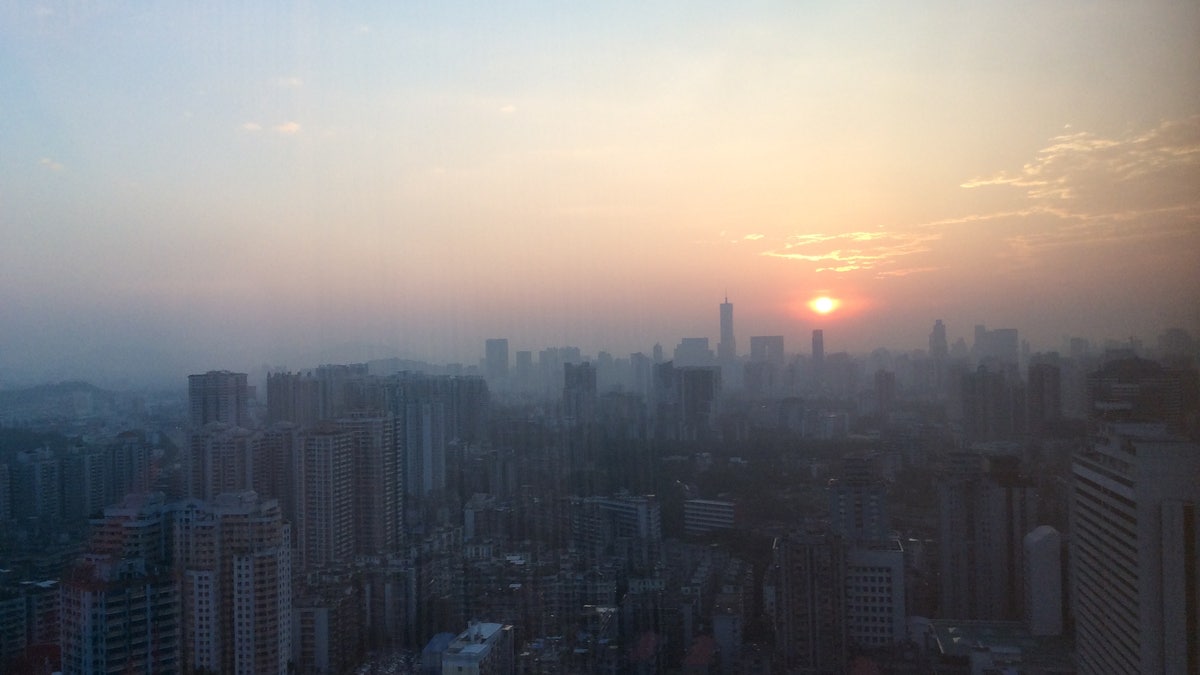
Guangzhou, China. (Christopher Kilham)
It’s hard to know which awful news story should occupy the most of our head space. Is it the gruesome ISIS beheadings? Russia’s invasion of Ukraine? The West African Ebola outbreak that is spiraling out of control? There are so many horrors to worry about.
Here in Guangzhou, China, my attention was drawn to the shelf in my hotel closet, where two scary-looking gas masks are supplied for my comfort. The room itself would be un-affordable in New York City or Chicago. It’s big, really big, with every conceivable amenity, from slippers and heavy terry-cloth robes, to a bed I’d like to ship back home. And at about $100 per night, it’s an amazing deal. But the gas masks really got me. There are even more in the beautifully appointed restaurant downstairs, hundreds of them in fact, in lurid red boxes. It makes you think.
Last night when I flew out of Beijing, it was like getting out from under a gray blanket. And this morning, staring out of my 43rd floor window, I gazed across the dim, miasmic skies of one of China’s less polluted cities. Perhaps the grand champion city of pollution is Harbin, in the far north. Known as "The Ice City," the features of the urban landscape disappear completely every year when the main coal-fired energy plant that heats the city turns on. The pollution is so thick, children make money by taking adults by the hand and guiding them to urban destinations. There is no visibility beyond about 100 feet for several weeks.
When I was a kid growing up in the suburbs of Boston, we had snow days. If there was enough snow, school was cancelled. Here in China, children have bad air days. If the air is too toxic, there is no school. Foreigners who live here spend big on apartment air filters and replacement cartridges. The Chinese government routinely publishes air pollution levels that are vastly lower than the same levels on the same day produced by the U.S. embassy in Beijing. I’m personally sticking with the U.S. figures, which show air entirely too toxic to support life long-term. I’m also already experiencing heaviness in my breathing, and a rasp in my throat.
In 1978, China consumed 610 million tons of coal for energy. Last year, the country burned a whopping 3.6 billion tons. Coal is the single most toxic energy-producing substance on earth, and everybody is trying hard to figure how to break the coal habit, with natural gas, wind, solar, you name it. Even the dreaded N-word comes up, despite the fact that Fukushima is still spilling radioactive water into the ocean every day, and has not yet been contained. China is now the leading producer of toxic particulate coal-derived air pollutants in the world. Add that to the 10 billion tons of carbon emissions produced here each year, and China’s 8-to-9 percent annual economic growth is hard to appreciate in the dimming haze of dangerous air.
This week, protesters in Berlin, Melbourne, Rio, Paris, New York and all over the world are marching in support of real climate change, not just rhetoric, from the U.N. climate change summit being held this week in New York. And as UNICEF official Alex Heikens has said, “Climate change is undermining the rights of every child today and the children of tomorrow.” Toxic air means lung disorders, including asthma, pulmonary insufficiency, lung and throat cancers, and emphysema. Children, whose lungs are more sensitive than those of adults, pay the big price for this gray-black version of economic progress. Chinese children are paying it forward.
And here is the thing: The Earth’s atmosphere is tiny. Every astronaut who has gone into space has marveled at how fragile the planet looks from above, and how the atmosphere is wafer thin. It’s not an optical illusion from deep space. The billions of tons of toxic coal that China burns every year produce atmospheric particulate matter that drifts around the globe. Translation: Your children in Santa Barbara are at risk too.
This is why clean air and the adoption of aggressive clean air standards is critical on a global level. Hundreds of millions of children globally are already dealing with pollution-caused breathing disorders, and the worst is yet to come. Gasping for breath and carrying an inhaler is no way to enjoy what should be the magical days of childhood. Gas masks in hotel rooms are no answer either.
As a yogi, and having taught yogic breathing methods for over forty years, I know the benefits of deep, thorough breathing. But here in China, even the elderly have stopped doing Tai Chi in many of the parks, because the flowing and sinewy practice turns into a wheezing fit. How do you tend to inner piece when your eyes are burning from caustic toxins?
We are entirely inter-connected. What happens in China also affects the children in Berlin, Rio, Milan and Chicago. Everybody has the right to breathe, deeply and fully, without a life-endangering disease. We must clean our air, or our children will have their best years stolen.
